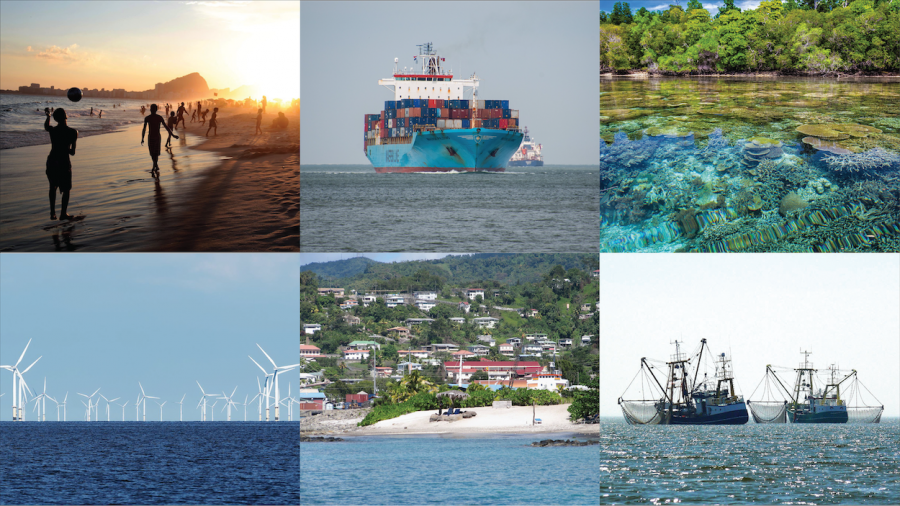
New Research Highlights Important Enabling Conditions for Effective Marine Spatial Planning
Study identifies 19 social and institutional conditions that can enable or hinder the success of global ocean management.
For release: June 8, 2022
Contact: rzuercher@sesync.org
ANNAPOLIS, Md – Is marine spatial planning working? Why or why not? New research identifies 19 sociocultural, political, and institutional conditions that can help researchers and practitioners predict and understand the success and failure of marine spatial planning initiatives. The study, conducted by researchers at the University of Maryland’s National Socio-Environmental Synthesis Center (SESYNC), appears today in the journal Marine Policy.
Marine spatial planning, or MSP, is an approach to managing the world’s oceans and coastlines that aims to bring together diverse stakeholders; consider the broad spectrum of ocean-use sectors; and adapt to changing ocean conditions and the evolving needs of coastal populations. In practice, MSP has seen varying levels of success in meeting various goals such as conserving and restoring healthy marine ecosystems, promoting sustainable economic development of the ocean, and improving the quality of life for coastal residents. In many cases, evaluating these complex, multi-objective governance initiatives is so difficult that stakeholders don’t have a good understanding of a plan’s true benefits and costs.
Lead author Rachel Zuercher—who conducted the research while at SESYNC and who is now a postdoctoral fellow at the University of Rhode Island’s Coastal Resources Center—says, “Our research started as an effort to evaluate marine spatial planning outcomes around the world. However, we quickly realized that without carefully considering the development and implementation processes for these plans—and whether those processes enabled certain conditions—we couldn’t truly understand the outcomes. We needed to dig into the planning process to know whether and why MSP was working for marine ecosystems and coastal communities.”
To better understand the planning process and how it links to outcomes, the team conducted a careful review of related academic literature (especially learning from work on marine protected areas and community-based conservation) and compiled expert opinions on factors that influence MSP success. To ensure a wide knowledge base that represented the diversity of MSP practice worldwide, the research team conducting the study included academics, practitioners, and conservation professionals who had experience studying and conducting MSP on all populated continents.
Senior researcher Jonathan Kramer says of the team’s approach to research: "The fact that our team members had backgrounds from multiple disciplines and different sectors meant that we were thinking about MSP evaluation in new ways. When we began focusing on the importance of enabling conditions, our interdisciplinarity allowed for more a comprehensive thinking on the topic that better matches the realities against which MSP unfolds."
In total, the researchers found 19 enabling or disabling conditions and organized them into an easy-to-understand framework. The conditions fit into four main categories:
- Plan Attributes – Aspects of the plan itself
- Legal Context – The legal authority for a plan
- Plan Development and Social Context – The ways in which people were or were not involved and empowered through the planning process
- Integration – How well the plan coordinates with many other layers of ocean and coastal governance.
Importantly, the authors also compiled a collection of real-world examples that highlight how each condition in these four categories can lead to success (where present) or contribute to failure (when absent).
Team member and MSP practitioner Vanessa Stelzenmüller of the Thünen Institute of Sea Fisheries says of the framework, “It allows practitioners to bridge the evaluation of MSP processes and outcomes, which has proven to be difficult for many reasons. This is why we suggest a practical and ready to use tool which can be transferred to any planning context. The need for more knowledge exchange between academia and planners can be facilitated through the application of the framework—in this way it can enable co-development of MSP.”
The authors present the framework as not only a useful tool when conducting MSP evaluation but also a jumping-off point for discussions during plan development.
Zuercher says, “It’s a roadmap of all these important conditions that when considered and worked on can enable future MSP success. Our research was the easy part; the hard part is being done by managers and stakeholders around the world working to create the conditions necessary for effective and equitable ocean governance. Our goal was always to develop this framework to be useful for them.”
This work was supported by the Gordon and Betty Moore Foundation (Grant #4506) with additional support from the National Socio-Environmental Synthesis Center (SESYNC) under funding received from the National Science Foundation DBI-1639145.
###
DOI: 10.1016/j.marpol.2022.105141
The paper, “Enabling conditions for effective marine spatial planning” is available at: https://authors.elsevier.com/sd/article/S0308-597X(22)00188-9
About SESYNC
The University of Maryland's National Socio-Environmental Synthesis Center (SESYNC) in Annapolis brings together the science of the natural world with the science of human behavior and decision making to find solutions to complex environmental problems. SESYNC is funded by an award to the University of Maryland from the National Science Foundation. For more information on SESYNC and its activities, please visit www.sesync.org.